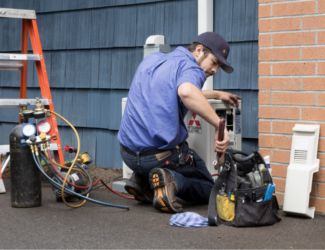
Staying safe
Safety is a top priority at the PUD, and we want to make sure you know how to stay safe around electricity.
Fallen power lines
Learn more >Portable generators
Learn more >Hot water temperatures
Learn more >More safety at home
Learn more >How & why electricity can kill you
Electricity flows along paths called circuits. When you turn the light switch on, you are closing a circuit (that is, creating a path) from the PUD’s electrical distribution system along power lines to your home’s wiring and then to your light bulb. When you turn off the light switch, you are opening that circuit, which then cuts off the electricity flow. Some materials allow electricity to flow through and others block it. Materials that allow electric current to flow are called conductors. Aluminum, brass, copper, silver, gold, and water make good conductors of electricity. Materials that do not conduct electricity are insulators (also referred to as non-conductors). Glass, rubber, and plastic are good insulators. That’s why appliance cords are usually plastic or rubber. Because our bodies are made up mostly of water (70 percent) and water is a conductor for electricity, human bodies are also good conductors. But you don’t EVER want to be part of the path of electricity because electricity strong enough to power appliances or turn lights on in your house could kill you. So always PREVENT yourself from becoming part of an electricity path or circuit. If you touch anything that has electricity flowing through it (this is called energized) that is also not insulated, you create a path for electricity, and it tries to flow through your body. And if the electricity flow is strong enough, it will kill you. That’s why you must stay away from energized power lines and also why you shouldn’t do things like stick metal objects into household appliances that are plugged into outlets.
Tips for staying safe
Outdoors:
- Never climb trees near power lines.
- Keep ladders away from power lines.
- Stay away from all downed power lines.
- If a power line falls on your car after an accident, stay in your car unless your car catches fire. Then jump out of your car, being careful not to touch the car and the ground at the same time, and shuffle at least 30 feet away, keeping your feet together as much as possible.
- Never let children play on the green padmount transformer cabinets, which are used to reduce electricity voltage.
- Don’t ever try to open the transformer cabinet or reach inside.
- Utility cabinets should not be buried in landscape material or surrounded by shrubbery because these may cause the cabinets to overheat and fail to function.
Flying a kite safely:
- Never fly kites near power lines.
- Choose an open space for kite-flying where there are no power lines or cars.
- Stay far away from power lines and anything that is touching them.
- If your kite somehow gets caught in a power line, do not touch the kite or string. Call the PUD for help.
- Don’t fly your kite when the weather is bad. Lightning can electrocute you.
- Only use string to fly your kite. Never use wire. Remember: metal is a conductor for electricity.
Indoors:
- Keep fingers and other objects away from electrical outlets.
- Never overload outlets with too many plugs.
- Never pull a plug out by the cord.
- Never use radios or hair dryers around baths or showers.
- Never put metal silverware into plugged in toasters.






